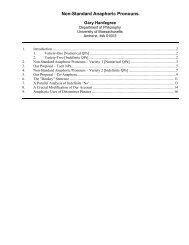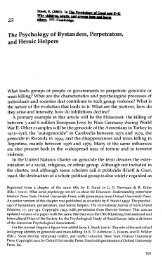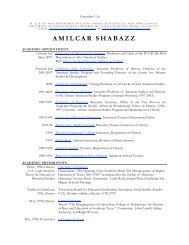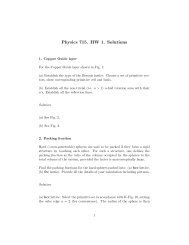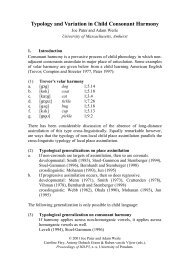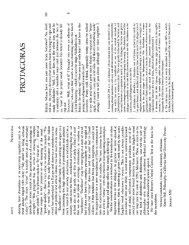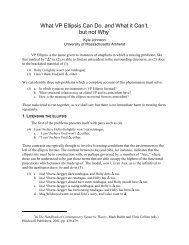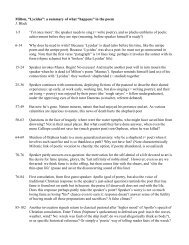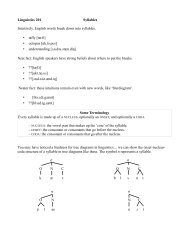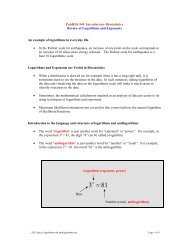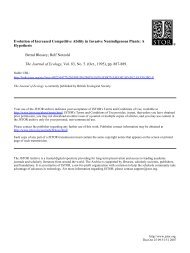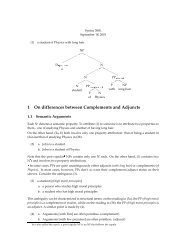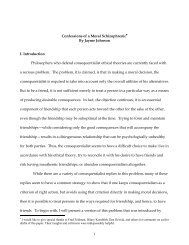Aristotle's Definitions of the Soul: "De Anima" ii, 1-3
Aristotle's Definitions of the Soul: "De Anima" ii, 1-3
Aristotle's Definitions of the Soul: "De Anima" ii, 1-3
You also want an ePaper? Increase the reach of your titles
YUMPU automatically turns print PDFs into web optimized ePapers that Google loves.
doctrine <strong>of</strong> <strong>the</strong> Metaphysics requires us to say that <strong>the</strong> new definition can<br />
only in a secondary way give <strong>the</strong> essence <strong>of</strong> anything (1030 a 17, ff.). This<br />
qualification leaves our earlier results unaffected.<br />
The upshot <strong>of</strong> those results is that <strong>the</strong> definition <strong>of</strong> <strong>the</strong> soul as <strong>the</strong> form <strong>of</strong><br />
<strong>the</strong> body (in any <strong>of</strong> its variants) should not be understood in <strong>the</strong> usual way.<br />
Correctly understood it does not entail that every soul is embodied. It does<br />
entail that certain types <strong>of</strong> embodied forms are souls but it does not tell us<br />
which types those are. So, as far as <strong>the</strong> definition goes, not only <strong>the</strong> intellect<br />
but o<strong>the</strong>r faculties <strong>of</strong> soul as well might exist unembodied or disembodied.<br />
Aristotle does not believe that many, if any, <strong>of</strong> <strong>the</strong>se o<strong>the</strong>r functions can<br />
exist unembodied but that is a matter which he undertakes to prove by<br />
showing that <strong>the</strong>se functions require <strong>the</strong> operation <strong>of</strong> specific bodily organs<br />
(see 413 b 13-29). The matter is not settled by <strong>the</strong> definition.<br />
It follows from this that in <strong>Aristotle's</strong> view <strong>the</strong> mind-body problem is not<br />
one that can be settled on what we would call conceptual grounds. The<br />
definition <strong>of</strong> soul in II, 1, being a nominal or semantic definition, is an<br />
account by reference to what is more familiar to us. As such it explicates<br />
what <strong>the</strong> common understanding <strong>of</strong> <strong>the</strong> notion <strong>of</strong> <strong>the</strong> soul is (Topics<br />
141 b 3-14). But this common understanding focuses on certain special<br />
cases <strong>of</strong> soul and does not incorporate any fully general description <strong>of</strong> what<br />
a soul is. So one cannot say in general on <strong>the</strong> basis <strong>of</strong> this account <strong>of</strong> <strong>the</strong><br />
ordinary concept <strong>of</strong> <strong>the</strong> soul what <strong>the</strong> relation between soul and body is.<br />
11. We may conclude by noting certain implications which <strong>the</strong> results <strong>of</strong><br />
ur study <strong>of</strong> <strong>Aristotle's</strong> definitions <strong>of</strong> <strong>the</strong> soul have for <strong>the</strong> interpretation <strong>of</strong><br />
Aristotle generally.<br />
At <strong>the</strong> end <strong>of</strong> <strong>De</strong> A nima II, I Aristotle speaks <strong>of</strong> his initial account <strong>of</strong> <strong>the</strong><br />
soul as a sketch "in outline" (Tv$vi). As we saw at <strong>the</strong> outset, he characteristically<br />
uses this expression to describe initial accounts <strong>of</strong> <strong>the</strong> sort which<br />
are "more intelligible to us" and which give only derivative facts about<br />
some entity ra<strong>the</strong>r than its essence." O<strong>the</strong>r passages ally accounts described<br />
in <strong>the</strong>se latter ways with nominal definitions. In Physics I, 1 (184 a<br />
16 - b 14) an account which is more intelligible to us is said to be <strong>of</strong> <strong>the</strong><br />
same sort as a nominal definition. And in <strong>De</strong> Anima II, 2 (413 a 13, ff.) an<br />
account which gives only a fact is said to be like a "conclusion" or nominal<br />
definition. This makes it apparent that an account "in outline" is likely to<br />
have important similarities, at least, with one or ano<strong>the</strong>r type <strong>of</strong> nominal<br />
definition.<br />
A striking proportion <strong>of</strong> what Aristotle says in his works - about everything<br />
from <strong>the</strong> syllogism to substance to <strong>the</strong> highest good - is qualified by<br />
use <strong>of</strong> <strong>the</strong> expression "in outline" and <strong>the</strong> related expressions applied in <strong>De</strong><br />
273



